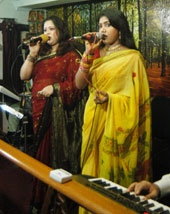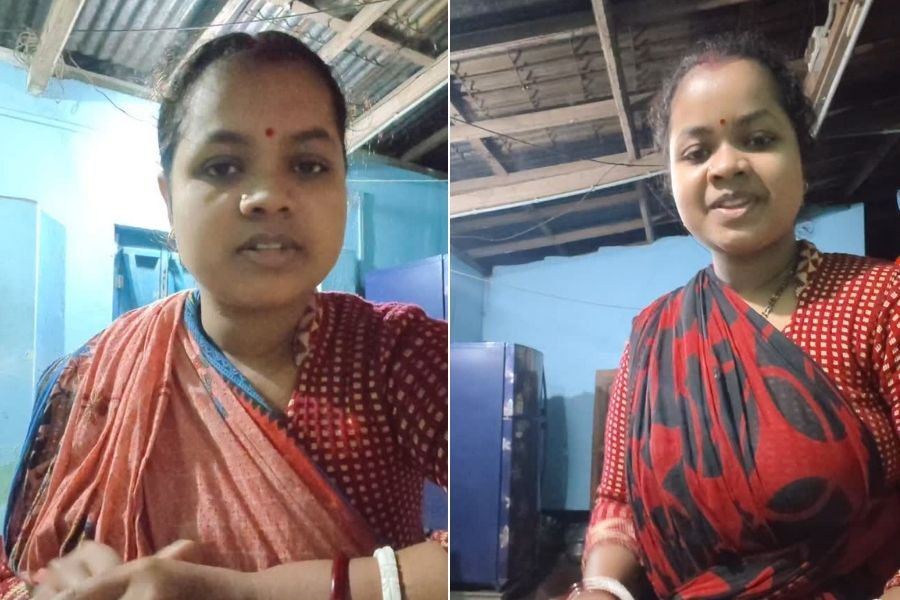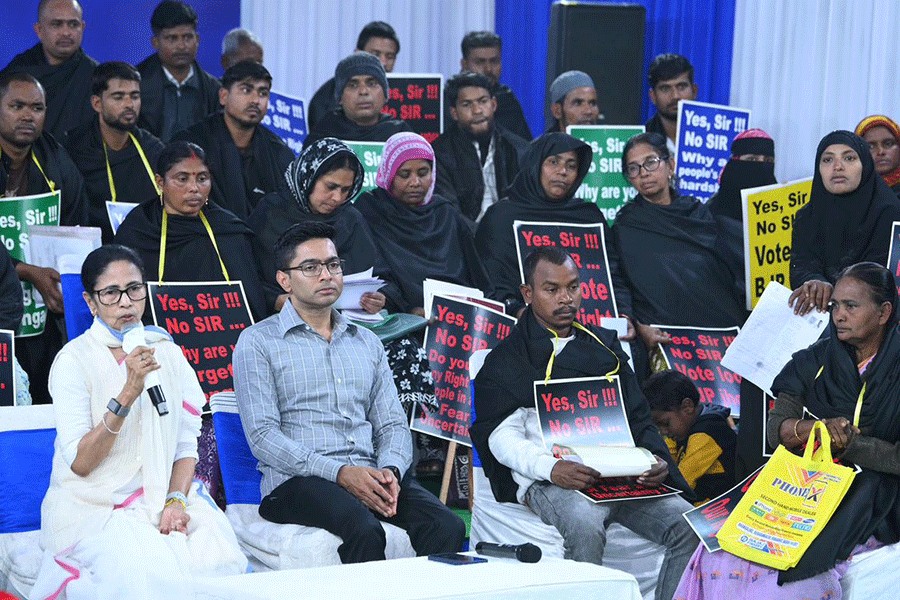 |
| Crooners at a bar in Calcutta Photo: Rashbehari Das |
The two friends had agreed to meet at a bar in central Calcutta for some chilled beer in the evening. They zeroed in on a place they both liked for its quiet ambience. As they settled down with their mugs of Kingfisher beer and plates of fish fingers, the shrill sound of Bheenge honth tere ? a hit Hindi film number ? shattered the silence in the room.
The source of the noise was a live band playing in a corner of the restaurant. A garishly-decorated stage had been erected by the bar counter. Moving around on it was a girl, dressed gaudily and belting out one pop song after another.
Ask Calcutta’s bar-goers and they will tell you that the days when they could go to their favourite bar and spend hours in quiet conversations with a companion are over. The city’s bars have surrendered to what one disgruntled customer calls “the invasion of the crooners”. In central Calcutta alone at least 10 to 12 bars ? Arhan Thai, Chung Wah, Duke, Embassy, Mansukh, Rocks, to name a few ? vie for the customer’s attention with “live singing”.
Take Chung Wah, located on Calcutta’s Prafulla Sarkar Street. One of the oldest bars in the city (125 years old), it recently succumbed to what managing director Bithi Chattopadhyay calls “the demand for live entertainment”. She explains, “Our own market survey reveals that most of today’s customers want singing. If we don’t give it to them, they will go somewhere else. And most bars today do have the provision for live entertainment.” In fact, says Chattopadhyay, when her family bought over Chung Wah last year, it was a “sick” unit and “we saw the institution of singing as one of the ways of improving the situation.”
Duke Bar and Restaurant on Central Avenue too revived its defunct live music programme “on popular demand”, says proprietor Subhodeep Chatterjee. “In the mid-1990s we discontinued our live entertainment programme because we felt there wasn’t a market for it,” he says. “But in recent times, a lot of people came to us and asked, ‘Why don’t you offer singing to your customers? Everyone else has it!’”
Other bar owners too attribute the renewed demand for bar singing to competition. Says C. Meghani, partner, Embassy Bar and Restaurant on Princep Street, “People today are accustomed to a certain amount of entertainment. They are flooded with films, videos and television programmes. It draws people. Ignoring it will be detrimental for business. You have to go with the flow.”
Not that the concept is new to the city. Cabaret dancing was always a part of the city’s night club culture with popular restaurants such as Trinca’s and Moulin Rouge being hot spots for customers with a taste for entertainment over and above a thirst for alcohol. In fact, as Pradip Roychowdhury, manager at Duke for the last 25 years, points out, “What I see happening now is a sort of revival of the past.”
The trend has become more noticeable in the past one year, triggering speculation that it is somehow connected to the August 2005 Maharashtra government ban on bar dancing in Mumbai. But Subhodeep Chatterjee denies that any of the musicians playing in his hotel are from outside West Bengal. “Everyone who sings here is local. One of the main reasons I didn’t want to employ a Mumbai bar dancing girl is because the Duke customer is very cultured. While they might like the occasional Hindi or Bengali film song, a large number of them also want to listen to tasteful songs such as Rabindra Sangeet or even devotional numbers like Shyama Sangeet.”
Dancing, he says, is forbidden at Duke’s, and the management is choosy about the singers. “We have a ban on what we consider ‘vulgar’, such as skimpy, body-revealing outfits or suggestive movements while singing.”
Pradip Bhattacharjee, cashier at Mansukh Bar and Restaurant on Bentinck Street, scoffs at the idea that Calcutta bars are making use of Mumbai’s girls. “There is so much talent here, we don’t need to look anywhere else,” he says. “We follow a strict no-dancing rule here and the police are very vigilant,” adds Meghani. He says, “The girls are not allowed to leave the stage except to go up to the green room.”
A number of bar goers might, however, question the veracity of these claims. After all, there is a thin line between stand-up singing and dancing, which is rather convenient for “law-abiding” bar owners who might consider a little hip-swaying a good way to help the mellifluous voice along.
Singing at bars is also often perceived as a front for prostitution. “I know she’s not a good girl,” says a customer at one bar, fishing out a crisp Rs 100 note from his wallet and passing it to the waiter to be handed to the singer on stage. “But I like her and I come here to watch her.” The girl in question, in a tight synthetic orange tank top and pants and pink lipstick, continues to smile as she mouths the lines of Raat Akeli Hai...come and whisper in my ears...whatever you like.”
Says a manager at another bar on Waterloo Street: “I know that some of them play outside, if you know what I mean. They just have to look a certain way and have a certain attitude and wear their clothes in a certain way. This is not about singing. This is about pleasing men who come here to drink.” The managers say the women hook up with customers, who range from college boys to businessmen, policemen to politicians, goons to householders.
But 28-year-old Manjila Dutta from Howrah, who sings at Duke every evening, takes these insinuations with a pinch of salt and washes it down with swigs from her Sprite bottle between songs. “It’s not that some among bar singers are not indulging in prostitution, but not everyone is. It’s like in any other profession. One might sleep one’s way to the top,” she says.
A bar singer at Mansukh, who looks every bit the bubbly post-graduation student that she says she is, stresses that her conscience is clear. “Frankly, I sing because I need the extra income.”
Her band leader, Indranath Chatterjee, a soft-spoken, octopad player, claims that he selects his musicians on the basis of their musical talent. And he adds that band leaders recruit more female singers than male “because more men come to bars than women”. An Embassy floor manager agrees. “For every 100 male customers, we get only one female customer and obviously most people prefer to look at the opposite sex,” he laughs. Bhaskar Biswas, a male singer at Duke, weighs in. “A male singer has to sing really well not to be booed off stage by drunken men. Female singers are more in demand.” While male singers earn Rs 1,000 approximately per night, female singers earn about twice that amount.
Subhodeep Chatterjee believes the focus should be on responsibility. “We have to be responsible,” he says. “We are not only answerable to the law enforcement agencies, from whom we have to secure a licence to play live music, but also to our customers.”
The customer is king, so the bar managers insist that there is place for those in search of quietude, too. From Duke to Embassy, Chung Wah and Mansukh, all have separate sections for those who “don’t want to be disturbed”. But, then, they add, “You cannot ignore the customer who wants to be entertained.”










